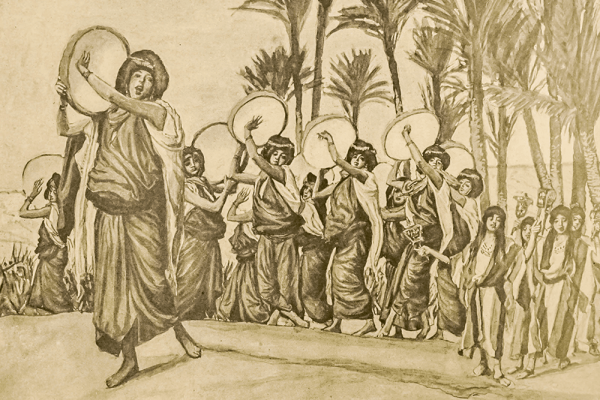In the Bible, there are four women credited with composing songs of worship. In their songs, and what we know of these women’s stories, the women address a God who acts to spiritually and materially liberate, nourish, and comfort. The women, in their songs, engage their community with authority, devotion, resolve, and assurance, offering praise for God’s work among and with them. These four women — Miriam, Deborah, Hannah, and Mary — have much to say about God and themselves. Their wisdom, recorded in scripture, should inform how we understand God. These holy songs display wisdom, reveal expressive definitions of God, and offer us unique revelations into God’s character in their — and our — lives.
Song of Miriam (Exodus 15:20-21)
Miriam is both the first woman to contribute a song to the Bible and the first woman named a prophet by scripture. These distinctions make Miriam “the archetype of the female prophetic tradition,” according to biblical scholar Phyllis Trible. The sister of Moses and Aaron, Miriam seems to work as the third leg on the stool of leaders during the exodus: Moses the deliverer, Aaron the high priest, and Miriam the prophet. Miriam’s song — which only takes up two lines of text — emphasizes liberation, celebration, and catharsis after witnessing a mighty work of God that freed the Israelites from oppression. Scripture notes that Miriam leads the Israelite women with tambourines and dancing before singing:
“Sing to the Lord, for he has triumphed gloriously;
horse and rider he has thrown into the sea.”
In her book, From Widows to Warriors, feminist biblical scholar Lynn Japinga writes that these two lines functioned as a call-and-response, sung at the same time as Moses’ song in Exodus 15. As a prophet, Miriam’s calling was to intuit the presence and work of God, and her song conveys those intuitions to the Israelites by proclaiming that the vanquishment of powerful oppressors — and the deliverance of marginalized people — is a divine triumph. Her role in the liberation of her people reminds Christians that women have always been suited for positions of spiritual authority. Her song, and the atmosphere of communal worship she created, can teach us that the women in our own families and congregations are worthy to lead us towards a remembrance of God’s justice and love.
Song of Deborah (Judges 5)
Deborah, like Miriam before her, was a prophet. She is the only female judge recognized in scripture. While judges at the time served as “charismatic military leaders,” biblical scholars Tikva Frymer-Kensky and Caryn Tamber-Rosenau, note that Deborah is “the only [judge] to be called a prophet, and the only one described as performing a judicial function.” The book of Judges says that after 20 years of Israelite suffering in Canaan, she exhorted the commander of the Israelite army, Barak, to begin a crucial attack on their oppressors (4:6-9). She invoked the authority of God to give the strategy towards their victory. Deborah sings with Barak after Jael assassinated the leader of an enemy army and the Israelites had secured victory and freedom from oppression for the next 40 years.
“To the sound of musicians at the watering places, there they repeat the triumphs of the LORD, the triumphs of his peasantry in Israel,” Deborah sings. “Then down marched the remnant of the noble; the people of the LORD marched down for him against the mighty.”
As a prophet, Deborah perceived the presence of God; as a judge, she exercised her wisdom in authority. Her song is dedicated to the people, and Barak “saw her as the embodiment of God’s presence,” writes Japinga.
Deborah’s attention and devotion to her people shows the significance of God’s regard for material wellbeing. Deborah, because of her commitment to faithfully fulfill her calling, cared for the wellbeing of the Israelite people. When women in our communities attend to the wellbeing of people around them, we should similarly honor them.
Song of Hannah (1 Samuel 2:1-10)
Hannah is a woman remembered for her motherhood, and her story parallels that of Sarah and Rebekah, two of the Hebrew matriarchs. She became the mother of the prophet Samuel after years of struggling to conceive with her husband and enduring verbal and emotional abuse from his other wife (who was able to conceive) (1 Samuel 1:6-7). She was devout, going to Shiloh to participate in sacrifices with her husband and his other wife yearly, and author Lillian Klein notes that Hannah “assumes that God can hear and respond to a woman’s prayer.” Hannah offered her song when God granted her a son after her fervent prayers (2 Samuel 1:20). “He raises up the poor from the dust; he lifts the needy from the ash heap, to make them sit with princes and inherit a seat of honor,” Hannah sings, honoring God as one who overturns the powerful and uplifts the oppressed.
During this time period, the ability to conceive directly affected a woman’s value in society. Hannah’s inability placed her lower than her husband and his other wife, and she suffered abuse so severe she could not eat (1:7). From Hannah’s song, we learn that women shunned and abused in their own families and marginalized in society can have a distinct perception of God’s favor towards them. Her song teaches that religious faith and certainty in God’s justice can coexist with an anxious desire to see our hopes confirmed.
Mary’s Song (Luke 1:46-55)
Mary is the only woman in the New Testament to contribute a song. She sings after making the arduous trek to her cousin Elizabeth’s home, and after they both had miraculously conceived within months of each other. She “announces an astounding reversal of fortunes … [she] feels the world’s balance shift toward the poor and lowly, and away from the rich and powerful” (Japinga 2021, From Daughters to Disciples). Her song, known as the Magnificat, is filled with echoes of the God-centered liberations of Hannah’s song, the people-centered actions of Deborah’s song, and the visible works of God in Miriam’s song.
“[The Lord] has brought down the powerful from their thrones, and lifted up the lowly,” Mary proclaims. “[H]e has filled the hungry with good things, and sent the rich empty away. He has helped his servant Israel, in remembrance of his mercy.”
When I read Mary’s song, I read someone who likely felt deeply connected to the holy women of her heritage and their songs. Rather than the white, virginal, and quiet mother often displayed in churches, the Magnificat presents Mary as inquisitive, full of temerity, and deeply attentive to the work of God among her people. Her song rebukes the pervasive idea that she was a passive vessel; instead Mary is a partner with God in bringing about his liberating work. Today, Mary’s song teaches us that we are to honor God’s work among women’s relationships with each other, and recognize that marginalized women are especially suited for proclaiming God’s liberating character and incarnation.
Got something to say about what you're reading? We value your feedback!







